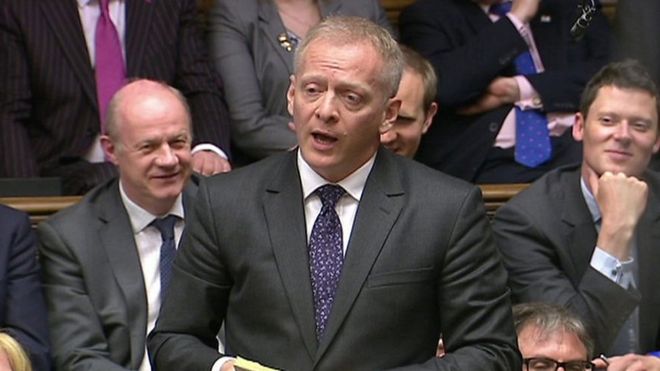Britain isn't currently a democracy, but it can be, says Natalie Bennett as she calls for a 'peaceful democratic revolution'.

It’s not something I say often, but Tory MP Phillip Lee, until Tuesday morning the Justice Minister, is right.
In resigning on principle before the Brexit votes, he not only called for a ‘meaningful’ parliamentary say in the process, but for a final ‘People’s Vote’ to decide whether to accept the deal.
That has to include an option to Stop Brexit. Politicians u-turn all of the time. The people must also have the right to do so.
Phillip Lee’s call for a People’s Vote is brave not just in party terms. The 2016 Brexit vote is still fresh in Britons’ minds, and the possibility, some would say likelihood, of direct democracy being a confusing, angry mess, is thus tied to the term.
But just as hard cases make bad law, so the referendum that David Cameron hubristically called with grossly inadequate notice, at a poorly judged time, with many keenly interested voters excluded, and in which the legality of one side’s actions is now seriously in doubt, shouldn’t be used in a rush to judgement.
One “bad” referendum doesn’t mean we should write off direct democracy. And a conclusion many different parts of our political system are coming to. Just before Phillip Lee’s announcement, the TSSA Union came out in favour of the People’s Vote.
The value and potential dangers of referenda got at Hay-on-Wye’s How The Light Gets In Festival last month. Yasmin Alibhai-Brown expressed distrust in “the will of the people” – amid fear about the rise of the far right in Europe, and worries about the public’s view on capital punishment and human rights.
All of those are rightful concerns. But I argued you have to start with the causes of our current political conditions, including the relative strength of the far and populist right and the Brexit vote.
There’s no doubt that many people, many communities and whole regions, are angry. And they have a right to be – particularly in Britain.
We have six of the ten poorest regions in Northern Europe, in a country that’s also home to London, where bankers and oil oligarchs contemplate just what to do with the second level of basement in their mansion.
It’s a nation where Westminster dominates local councils, forcing them into accepting unsuitable mass housebuilding sites or overruling them on crucial issues such as fracking. And with the first-past-the-post electoral system, 68% of votes in the 2017 election didn’t count. It’s no wonder so many don’t bother to turn out for what is a simulacra of a democracy.
Lack of democracy is what got us here. The cry from the heart of “take back control” was exactly right, just the target was wrong.
The impulse in 2016, to use the only vote everyone knew they’d have an equal say in to do something drastic, to shake up a failing system, was understandable, even in retrospect unsurprising.
What do you do with the idea that you “can’t trust the people”? If you accept that and act on it, it means you make our society even less democratic than it already is now – and make people more inclined to lash out. That’s no solution; it is actively dangerous.
Instead, we need to say to the people of Britain “we believe in democracy and we trust you”.
Of course we should do democracy differently – in fact we should make Britain a democracy, as it isn’t now, with its archaic first-past-the-post electoral system, unelected House of Lords, uncontrolled political donations and its uncodified constitution.
We need a clear, written constitution – with rules that include a place for referendums on major national decisions, which might also include a demand for more than simple majorities for major changes (as most organisations have for their constitutions).
In the two years since Cameron’s referendum, we’ve had a lot of the debate that we should have had before the 2016 vote. “Why did no one tell us about the Irish border issue?” I was asked passionately at a debate last year. No one paying any attention at all can avoid being aware of that now.
I look at the rapid growth of civil society campaigns to stop Brexit from Leeds for Europe to Women for Europe, to debates about European unity that I took part in last week in Sheffield’s Festival of Debate, and see something that’s starting to look more like the Scottish independence referendum in its broad public engagement (and turnout of 85%). People are far more informed on the Brexit issue now than in 2016.
The path to a peaceful democratic revolution starts with a People’s Vote that stops Brexit, while also building momentum for creating an enshrined constitution based on the principle that parliament should reflect the will of the people.
Who should draw up the new constitution? Well I think, the people. Let’s trust them. Call a people’s constitutional convention.
In two years we could have a proper democratic election, a proportional vote, and a democratic Britain, in which voters are engaged, informed, know their voice will be heard – and in which we’d still be in the EU.
Natalie Bennett is the former leader of the Green Party of England and Wales.
To reach hundreds of thousands of new readers we need to grow our donor base substantially.
That's why in 2024, we are seeking to generate 150 additional regular donors to support Left Foot Forward's work.
We still need another 117 people to donate to hit the target. You can help. Donate today.



